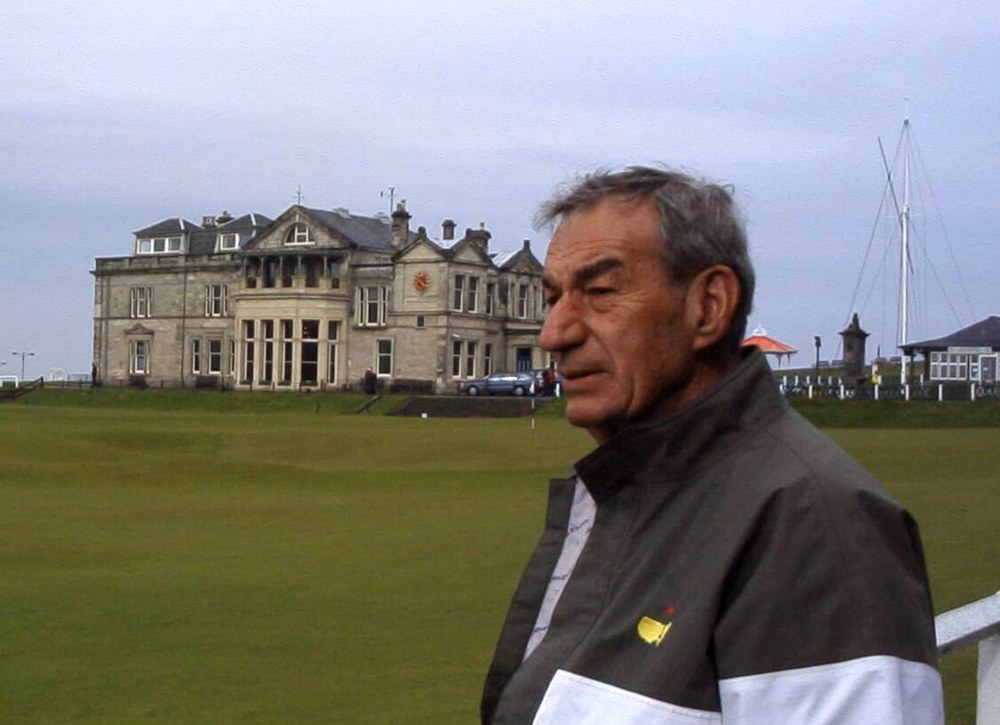Director, 1957-1989

Joseph M. Duich, Ph.D.
Joseph M. Duich, professor emeritus of turfgrass science, received both his B.S. in turfgrass management (1952) and his Ph.D. in plant breeding (1957) from Penn State. Duich focused his doctoral research on turfgrass breeding, particularly Merion bluegrass.
Duich joined the Penn State faculty in 1955. During his academic career he taught almost 6,000 graduate, undergraduate, and two-year turfgrass students. He is well known for developing Penn State's two-year golf turf technical program, which began in 1957. The two-year program, designed for individuals wanting to become golf course superintendents, included courses in turfgrass management, plant pathology, irrigation, fertilization, seeding, and botany, as well as English, speech, personnel management, and social etiquette.
Duich's research has spanned almost all areas of turfgrass management, including breeding, diseases, breeder seed production, roadside development, soil modification, fertilization, weed control, and species competition. He worked with his advisor, H.B. Musser, on the development of Penncross bentgrass, which was released in 1954. Today Penncross is the most widely used bentgrass on golf courses around the world. "Penncross had its first commercial production in 1956, then we really started cranking it out in the 1960s," he says. Originally for putting greens, Penncross is now a popular grass for fairways as well.
Among other Penn turf varieties that Duich helped develop are Pennfine perennial ryegrass, Pennstar Kentucky bluegrass, Pennlawn creeping fine fescue, and Penneagle creeping bentgrass, a popular fairway grass. Duich has also released seven bentgrasses since his retirement in 1991.
With the release of so many new turfgrass varieties came royalty monies, and Duich generously donated all of his turfgrass patent royalties to Penn State. "When I came on as agronomy department head in 1986, Duich's grasses were bringing in about $100,000 a year in royalty income," says Al Turgeon, professor of turfgrass science. "That's what he ran his program on. That was his budget to hire people, cover equipment costs, operate the facilities."
In 1990, the bentgrass seed market exploded as golf courses moved beyond using bentgrasses for greens and tees and began using these grasses to overseed fairways. "The royalty income doubled and tripled," says Turgeon. "The money was accumulating, and I called Joe and said, This is absurd. We're bringing money in much faster than we can effectively use it." Turgeon and Duich consequently set up the Joseph M. Duich Turfgrass Endowment as a permanent income-generating resource. Today the endowment's principal stands at about $2.4 million, generating about $120,000 a year in interest. "This makes it possible for us to run the turf plots solely on interest from the endowment," says Turgeon. "It's been a wonderful asset to our program, and we have Joe Duich to thank."
While Duich is recognized internationally for his research, perhaps he is just as well known for his excellence as a teacher and his personal interest in his students. "Joe was a magnificent teacher," says Pat, his wife of more than fifty years. "I remember when I went to my first convention with him. It was in New Orleans, and we couldn't walk down the street without being stopped by former students. It was Dr. Duich this, Dr. Duich that. They all told him what a difference he had made in their lives."
Says colleague and plant pathologist Herb Cole, "Joe was a demanding taskmaster. His premise was that managing a golf course is an unforgiving profession. It's a profession of detail, and you pay for every mistake. There's no room for slackers. And Joe drilled that into his students."
For many students, Duich's reputation as an intimidating professor was cause for initial concern. "I was scared of Dr. Duich before I even got to Penn State," says John Pollok, a 1987 graduate of the two-year program, now director of agronomy at Robinson Ranch in Santa Clarita, California, and president of Penn State's Turfgrass Alumni Club. "On the first day of class, he drew a circle on the chalkboard and cut it into a pie. He said, 'To succeed in this business, ten percent depends on your ability to grow grass, and ninety percent depends on your ability to communicate.' I was there looking for the secret of how they grew the grass, so that shocked me. But I took it to heart, and it has held true. Dr. Duich wanted us to think on our feet, and he taught me that golf course management is more of an art than a science."

